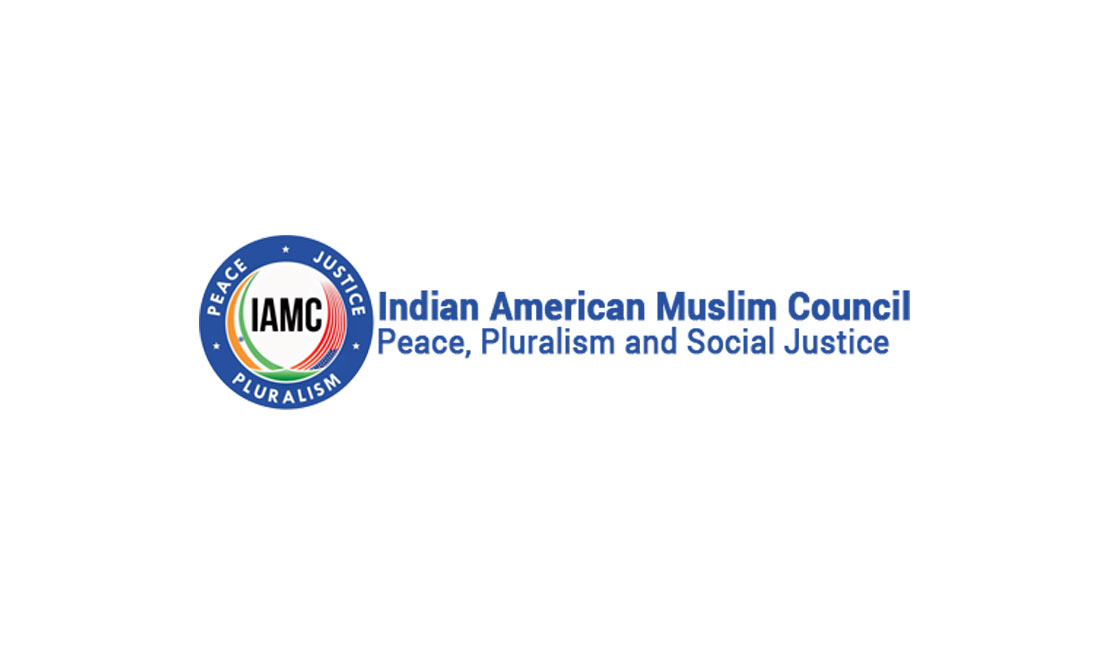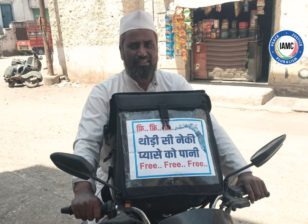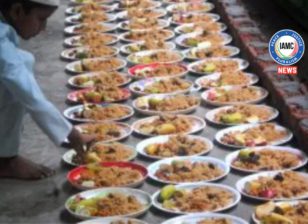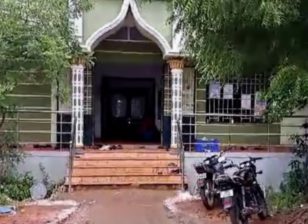Miracles in Asansol: As coal city burnt in hatred, a Muslim cleric and Hindu temple healed with love

The imam’s plea for peace in the wake of his son’s murder inspired Muslim youth to safeguard the homes of Hindu neighbours. (photo credit: Samir Jana / HT)
We mounted the stairs of the tranquil 200-year-old Noorani mosque in West Bengal’s coal city of Asansol with trepidation. What could you say to a man who had just lost his 16-year-old son to a hate mob that would give him any kind of solace?
The imam, Maulana Imdadullah Rashidi, was seated on a mat, his head bowed, composed. He held our hands by turn, accepting with grace our ineffectual words of sympathy. Rashidi’s father had migrated from Samastipur in Bihar to Asansol when he was only a child. His father had served for much of his life as the imam of a mosque in a colliery near Asansol. Rashidi was appointed the imam of the Noorani mosque 30 years ago, and since then his life has circled around the mosque, as he leads its prayers five times every day and serves his community.
His story is by now well-known. Asansol had not witnessed communal violence for 26 years. Never in the past was Ram Navami, the spring festival celebrating the birth of Lord Ram, an occasion for mass public festivities or processions in West Bengal. This changed over the past couple of years, when the Bharatiya Janata Party, its ideological parent the Rashtriya Swayamsevak Sangh and associated organisations converted the religious event into an occasion for the display of belligerent communal militancy, with an aggressive display of weapons and incendiary anti-Muslim sloganeering. In the days following Ram Navami on March 25 this year, processions were organised in various parts of the state, each time passing through Muslim colonies and mosques while playing loud music and shouting provocative slogans. The processions were of men with saffron bandanas, on foot or riding motorcycles and small trucks, displaying swords, and screaming feverishly – that Muslims will have to shout Jai Shri Ram or fall to the sword, and that there are only two fit destinations for a Muslim, Pakistan or a cemetery.

Till March, Asansol had not witnessed communal violence for 26 years. (Photo credit: John Dayal / Facebook)
It was a riot waiting to happen, a classic “manufactured riot”. The processionists were itching for a fight. It was not long before some hot-headed young Muslim men rose to the bait, enraged at the taunts and provocations. Their heated arguments rapidly deteriorated into fist-fights, and before long blood began to flow as mobs of young men set fire to shops and homes. The state administration and police cannot credibly explain why they allowed armed processions with loudspeakers spouting hate to pass through Muslim residential areas. Their complicity in allowing Asansol to burn is beyond question. Reports in Scroll.in confirm that the police arrived too late to control the riotous mobs.
When they did arrive, they discharged teargas shells to disperse the crowds. People ran in panic in all directions. One among the fleeing crowds was Sibghatullah Rashidi, the fourth son of Imdadullah Rashidi. He had recently written his high school examinations and awaited his results. His father was proud that the boy had memorised the Quran and had been honoured with the title Hafiz. On the afternoon of March 27, Sibghatullah Rashidi was studying in his madrassa, which stood close to a Hindu settlement, when the rioting broke out. He rushed out in panic to return to the safety of his home, but in the melee and the teargas fog, he lost his bearings and ran instead into the Hindu colony.
A father’s decision
In time, curfew was imposed, and parents on both sides of what they now call the border anxiously counted their children. It turned out that two Hindu children had been captured by men in the Muslim settlement, and one boy – Sibghatullah Rashidi – was confined by the Hindus. It became an archetypal mutual hostage situation, with no side willing to let go of their captive until the other was returned. The police sought the intervention of the imam, and he was firm. “There can be no conditions,” he said. “We cannot hold with us these two terrified Hindu children. Let them be returned safely to their parents. We hope that our boy will also be restored.”
Imdadullah Rashidi’s older son went to the police station to report that his brother was missing. The police locked him up and it was only after the intervention of the local municipal councillor that he was freed. Meanwhile, the family waited anxiously for Sibghatullah Rashidi’s return. It was near midnight when the councillor called the imam, with the grim news that the police had found the mutilated body of a teenaged boy, who was probably his son. The imam said to him, “Don’t announce to anyone that my son has been killed. It is night. If people get to know, hot-headed boys will attack the Hindus in the darkness. I will myself tell them in the morning.”

Police patrol the streets of Raniganj, Asansol, after a Ram Navami procession turned violent. (Credit: PTI)
Desolate in the certainty that his young son had been killed, Imdadullah Rashidi sat in the mosque through that long dark night, alone with his memories, his torment and his prayers. Early the next morning, after the first azaan for the sunrise fazl namaaz rang out, the faithful gathered at the mosque. He broke the tragic news to them, that his son had been killed. He then made a plea that stunned each of them, “If you love me,” he said, “then I ask from you at this moment only one promise. That with your tongue or with your hand, none of you will cause any harm to any Hindu.” No eye was dry as they listened to his impassioned plea.
The imam then reclaimed his boy’s body from the mortuary, and bathed it in preparation for the funeral. It was impossible for the father, composed so far, to hold back his tears. The boy’s nails had been pulled out, one eye smashed, his body full of stab wounds, and portions of his body burned. (I saw a photograph of the mutilated body of the boy taken before he was buried).
Most of the young men of the Muslim settlement in the Shitla Dangal area around the Noorani mosque had grown from boys in half-pants to manhood before the imam’s eyes. He was there at every family celebration, and every occasion of mourning in their lives. They loved and respected him. Therefore, his counsel against revenge was like a flood of cool water over the fires that stirred in their breasts. The Hindustan Timesreported that, inspired by the imam’s sermon, Muslim youth started guarding the shops and property of the few Hindu families who live near the Noorani mosque. Mehtab Alam, a resident who greatly reveres the imam, told the reporter, “After Sibghatullah’s body was found some youths got furious. But we calmed them down. Not a single house, shop or the lone Shiva temple was attacked.” Another resident, Mohd Kalam, said Muslims were keeping a close watch on properties owned by Hindus so that no outsider can create fresh trouble. RK Verma, a jeweller, testified that his Muslim neighbours had protected his shop. “I was not in town when the riots took place. I got very scared because there was valuable jewellery inside. When I called up my neighbours assured me that everything would be safe,” he said to the reporter.
But who can still the agony of a parent’s heart? Siyasat carried a translation of the imam’s diary entries three days after his son was killed:
“Three days have passed since Sibghatullah passed away, but it seems that he is somewhere around… Munna will help his mother in her chores, will arrange the kitchen, clean the surroundings and then ask his mother, ‘do you need me to get something for you?’ If mother would say ‘no’, he would quietly leave the house… It was his responsibility to wash my clothes, iron them, polish my shoes, and keep the handkerchief, cap and wallet on the table. Doing the petty household chores on time and going to masjid along with me for the prayer was his daily routine. Rarely did it happen that he did not go to masjid with me. Local devotees were so used to seeing him with me that if they didn’t see him, they would stop me and ask, is your son fine?… Then when they would see him in Maghrib or Isha prayer the devotees would feel a strange sense of relief. It’s almost 16 years, but Munna never talked in a loud voice. He was so obedient that my relatives used to envy my luck. They would say, ‘in today’s world when young boys are crossing the limits of ill-manners, your son is a real gem’. Hearing this I would pray for Munna’s long life. I had no idea that he would leave us so soon. I feel like calling him and saying ‘see what has become of your mother after you have gone, see how numb your brothers have become. How messy the kitchen looks. My clothes are lying as they were. I don’t know where my handkerchief, cap and wallet are. No one has arranged my table in these days. Do I have to go to masjid alone? How could I face the eyes of those devotees, who don’t even ask about you now?’”
When the Karwan e Mohabbat team met Maulana Imdadullah Rashidi in his room in the mosque, 10 days had passed, and he said to us that he did not want to open his fresh wounds. “For 30 years, I had spoken of the teachings of Islam to my people here. When my son was killed, it was a moment of test for me by Allah. I had lost my son, but not my imaan, my faith. It was Allah who showed me the right path. Islam teaches peace,” he explained. “Islam teaches compassion, Islam teaches us to help one another, to never oppress another human being.” He added, “Every religion teaches peace and love.”
One member from our team said to him, “What you did is very rare.” His response was sharp and immediate: “It is not rare! I am sure many others in my position would have done what I did. You came to know me because my son died. But I am sure that the large majority of Muslims and Hindus wish to live together only with peace and love.”

Maulana Imdadullah Rashidi, imam of the Noorani mosque in Asansol. (Photo credit: John Dayal / Facebook)
The debris of riots
Other parts of the city, outside the influence of Maulana Imdadullah Rashidi, were not so calmed. We walked the small lanes of another working-class, mixed settlement of mostly Bihari immigrants. Here, Muslims had ravaged Hindu homes, and Hindus the houses of Muslims. In hours, the lifetime savings of very poor people had gone up in smoke. People spoke of a daughter’s dowry here, a fridge there, two laptops in another home, a television set elsewhere, all now reduced to black, sooty rubble. This is the same debris of riots – of the dreams of poor working people – that I have seen too often. A woman with sindoor in her hair sobbed at one burnt doorway, a man in a skullcap was bent over in grief in another. “How will we start life again?” each asked. And, “why did they do this to us?”
The words of Bashir Badr ring in my ears:
“Log toot jaate hain ek ghar banana mein
Tum taras nahi khate, bastiya jalane mein.”
(People break as they struggle to build one home,
You don’t have pity as you set fire to entire settlements.)
As we drove through the city, we were struck by the profusion of triangular saffron flags wherever we turned, embossed with the slogan that has come to be associated with militant Hindutva – Jai Shri Ram. It was these flags that proved useful to rioting mobs in mixed settlements to identify Muslim homes, because these were the homes with no flags. We did not spot a single red flag anywhere. No political worker from either the ruling Trinamool Congress or the Left was visible, offering solace to the distraught victims, helping them rebuild their lives.
‘Miracle of empathy’
But hope still fought its way into the gloomy township. Not just the imam’s magnificent words in the midst of his torment as he held the mutilated body of his beloved Munna: “It will be an even greater tragedy for me than the loss of my son if anyone raised even a finger against any Hindu.” On a street in the old city of Asansol, we encountered another small miracle, and then another. I quote here from the Facebook post of a member of Karwan e Mohabbat, John Dayal:
“Once there was a Muslim Pir, a learned man who came from Orissa and settled in a small hamlet outside the then town Asansol. For all practical purposes he was also the local doctor and spiritual leader. Women, some Muslims but mostly Hindu, would send their ailing children to him to be blessed, sure their upset stomachs and sundry fevers would vanish. The old man built a small platform in memory of the grandsons of the Prophet, peace be upon him, on the road… His descendants live nearby, small shopkeepers and mechanics like Mohammad Ismail… During the March violence, raging mobs burned his shop and demolished the Pir’s platform at the Imambara Chowk.
“Then the miracle happened. The locality has an ornate Kali temple, its managing committe led by secretary Moloy Majumdar, who grew up nearby, felt something was not right. ‘These were our people,’ he told #KarwaneMohabbat. The temple committee decided to rebuild the tiny Imambara. Within days, it was built. Now people come here to see the new miracle of empathy.”
Moloy Majumdar told us that this was the only Muslim family that lived on their street. “We always thought of them as our own people,” he said. How many times, when they were children and sick, had their mothers sent them to the old pir, their grandfather, to seek his blessings for their good health?
The day the city went up in flames, they guarded the imambara, their shop and their home. But at night, some miscreants broke down the small imambara, and set their motor repair garage aflame as well. Majumdar said he could have easily rebuilt the imambara with his own money. But he felt it would be more fitting if the Kali Mandir Society took this responsibility. He made this proposal to the other members of the temple society, and they accepted this unanimously. Ten days later, when we visited Asansol, the walls had been rebuilt, with a fresh coat of paint, and a sign of gratitude acknowledging the Kali Mandir Society.
Many Muslim friends spoke to Majumdar about how touched they were by this gesture. To reciprocate, a Muslim businessman, Haji Nanhane Khan, decided to donate Rs 10,000 each to 12 Hindu shopkeepers whose shops were burnt down in the carnage.
It is evident that there is something that the deluge of saffron flags, brandished naked weapons, hate slogans and a supine state administration has not been able to crush in this Bengali coal township.
While parting with us, the imam said wistfully, “I think sometimes of the man who killed my son. I think maybe even his eyes filled up like yours when he heard of my words after my son died.” Maybe love was stirred even in his heart.
Reference:





